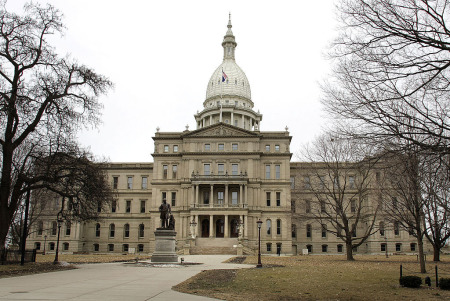Catholic parish, families sue Michigan over LGBT interpretation of civil rights law

A Catholic parish and a group of families have filed a lawsuit against Michigan over concerns that a state-level civil rights law will be used to force the parish’s school to violate its religious views on marriage and biological sex.
Sacred Heart of Jesus Parish of Grand Rapids, along with three pairs of parents who have children enrolled at its school, filed the complaint on Thursday in the United States District Court for the Western District of Michigan, Southern Division.
At issue is the state government’s implementation of the Elliot-Larsen Civil Rights Act, which involves interpreting the law’s ban on sex discrimination to include sexual orientation and a person's chosen gender identity.
“To comply with Michigan’s re-understood laws, Sacred Heart Parish and its school, Sacred Heart Academy, would be forced to hire faculty and staff who lead lives in direct opposition to the Catholic faith, speak messages that violate Church doctrine, and refrain from articulating Catholic beliefs in teaching its students and when advertising the school to prospective students or job applicants,” read the complaint.
“All of this violates Sacred Heart’s free speech and free exercise rights. Rather than defy Catholic doctrine in these ways, Sacred Heart would shut down.”
Defendants named in the lawsuit include Michigan Attorney General Dana Nessel, Michigan Department of Civil Rights Executive Director John E. Johnson Jr., and members of the Michigan Civil Rights Commission.
The Catholic parish and the parents are being represented by the Alliance Defending Freedom, a legal organization that defends religious freedom and free speech and has successfully argued religious liberty cases before the U.S. Supreme Court.
ADF Senior Counsel Ryan Tucker said in a statement on Thursday that he believed state officials were “forcing Sacred Heart to make an unconstitutional and unconscionable choice: either cease teaching and practicing the Catholic faith or close their doors forever.”
“Sacred Heart parish has faithfully served Grand Rapids families for more than a century, and its school provides a rich academic and spiritual environment for hundreds of children,” stated Tucker.
“The government should respect their constitutionally protected freedom to follow the very faith that has motivated them to serve their community.”
In July, the Michigan Supreme Court ruled in the case of Rouch World LLC et al. v Michigan Department of Civil Rights et al. that the state ban on sex discrimination includes sexual orientation.
"Sexual orientation is 'inextricably bound up with sex,' because a person’s sexual orientation is generally determined by reference to their own sex," ruled the state's highest court.
"For example, attraction to females in a fellow female is considered homosexual, while the same trait in a male is considered heterosexual; the sex of the individual at issue is necessary to determine their sexual orientation. To discriminate on the basis of sexual orientation, then, also requires the discriminator to intentionally treat individuals differently because of their sex."
The state high court drew from Bostock v. Clayton County, Georgia, in which the U.S. Supreme Court ruled 6-3 in 2020 that Title VII of the Civil Rights Act of 1964 applies to sexual orientation and gender identity, even though neither is specifically mentioned in the law.
Michigan Attorney General Dana Nessel supported the state Supreme Court ruling, arguing in a statement released in July that it was "critical that those of us elected to public office work to preserve and protect the rights of all residents."
"Our residents deserve to live in a state that recognizes the value of diversity and rejects the notion that our own civil rights law could be used as a tool of discrimination," she stated. "This ruling is not only a victory for the LGBTQ+ community, but for all Michigan residents, and one that's long overdue."
This is not the first lawsuit leveled against state officials over the interpretation of civil rights law, as Christian Healthcare Centers of Grand Rapids filed a complaint in August, with the support of the ADF.
CHC argued that the interpretation of antidiscrimination law would force them to, among other things, use the preferred pronouns of trans-identified patients and prescribe puberty blockers to transitioning individuals, even though both go against the organization’s beliefs.





















